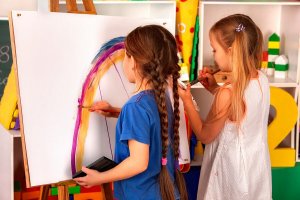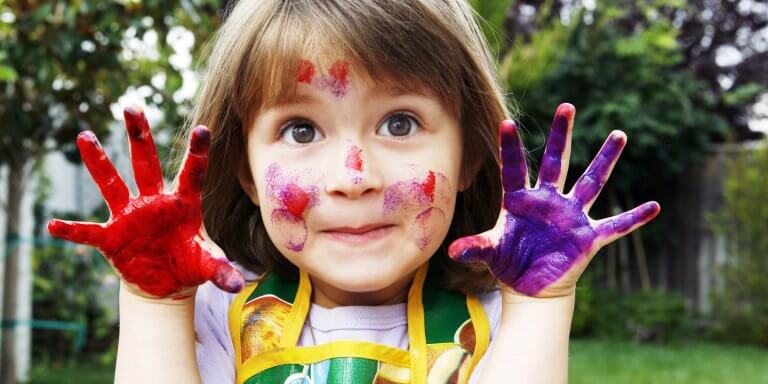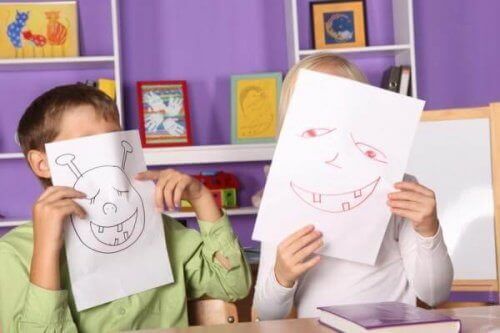The Benefits of Art Workshops for Kids

Art workshops for kids have many benefits. In addition to supporting their development, workshops feed kids’ creativity and imagination. Here are a few of the advantages of these groups.
Regardless of which craft you choose to focus on, kids love being a part of these workshops. In them, they get to play with objects, create new shapes, and recreate scenes from their lives.
Of course, learning is good, but learning while having fun is even better. Art workshops are essential in this sense for parents who want to offer valuable experiences to their children.
Art workshops also support development of creativity and concentration. There are so many benefits to art workshops!
The Benefits of Art Workshops for Kids
The benefits of art workshops for kids have more to do with the creative process than with the actual artistic value of the pieces they create. Kids should forget the restrictions of reality and let their imaginations fly.
Art workshops are very beneficial for children. Here are some of the key advantages:
1. Guaranteed fun
It’s fun to be creative. Art workshops give kids the opportunity to learn new things through play.
Furthermore, it allows them to spend time and share experiences with peers. Meeting new people is always fun for kids. Conversation and smiles are a sure bet when they meet new friends.

2. Inspiration within reach
One big advantage of going to an art workshop is that the children have access to everything they need for their creations. They don’t have to worry about finding a space to work or not having what they need to finish their projects.
In the workshops, teachers guide the kids through the techniques for making a variety of projects. Freedom to create has no limit, nor does their capacity to learn. The teachers will also help the kids get inspiration from their classmates’ work.
Then the magic happens: everyone starts working with the materials, exploring, experimenting, and unconsciously creating their own style.
“Every child is an artist; the problem is staying an artist when you grow up.”
–Pablo Picasso–
3. Creative freedom
Being able to create freely empowers children. They’re able to show both who they are and how they feel. The magic of freedom is that both the creative process and the result reflect the person who has created them.
Creative freedom helps kids create without limits or conditions. Kids are allowed to do what they feel. Keep in mind that if you impose conditions, they’ll stop showing their full selves.
4. Fostering relationships
Art workshops are very positive experiences for kids because of the way they allow them to be open and show who they are.
At the same time, they share this experience with other kids. This prepares them to learn at a more global level.
Art workshops let kids meet like-minded peers. Kids can show who they are, which fosters relationship building. Being open and without any external limits makes it easier to form new relationships.
Finding someone with the same passions as you is always a pleasure. Workshops are a great place to find other people who share your interests.

5. Teamwork
Art workshops teach kids the value of working together as a team. Children who go to these types of classes work on projects with their classmates. This shows them the potential they have when they work together for the same goal.
It’s certain that kids need to discover and learn about the world around them. For parents who want to foster their children‘s artistic and intellectual abilities, art workshops are a wonderful option.
Art workshops for kids have many benefits. In addition to supporting their development, workshops feed kids’ creativity and imagination. Here are a few of the advantages of these groups.
Regardless of which craft you choose to focus on, kids love being a part of these workshops. In them, they get to play with objects, create new shapes, and recreate scenes from their lives.
Of course, learning is good, but learning while having fun is even better. Art workshops are essential in this sense for parents who want to offer valuable experiences to their children.
Art workshops also support development of creativity and concentration. There are so many benefits to art workshops!
The Benefits of Art Workshops for Kids
The benefits of art workshops for kids have more to do with the creative process than with the actual artistic value of the pieces they create. Kids should forget the restrictions of reality and let their imaginations fly.
Art workshops are very beneficial for children. Here are some of the key advantages:
1. Guaranteed fun
It’s fun to be creative. Art workshops give kids the opportunity to learn new things through play.
Furthermore, it allows them to spend time and share experiences with peers. Meeting new people is always fun for kids. Conversation and smiles are a sure bet when they meet new friends.

2. Inspiration within reach
One big advantage of going to an art workshop is that the children have access to everything they need for their creations. They don’t have to worry about finding a space to work or not having what they need to finish their projects.
In the workshops, teachers guide the kids through the techniques for making a variety of projects. Freedom to create has no limit, nor does their capacity to learn. The teachers will also help the kids get inspiration from their classmates’ work.
Then the magic happens: everyone starts working with the materials, exploring, experimenting, and unconsciously creating their own style.
“Every child is an artist; the problem is staying an artist when you grow up.”
–Pablo Picasso–
3. Creative freedom
Being able to create freely empowers children. They’re able to show both who they are and how they feel. The magic of freedom is that both the creative process and the result reflect the person who has created them.
Creative freedom helps kids create without limits or conditions. Kids are allowed to do what they feel. Keep in mind that if you impose conditions, they’ll stop showing their full selves.
4. Fostering relationships
Art workshops are very positive experiences for kids because of the way they allow them to be open and show who they are.
At the same time, they share this experience with other kids. This prepares them to learn at a more global level.
Art workshops let kids meet like-minded peers. Kids can show who they are, which fosters relationship building. Being open and without any external limits makes it easier to form new relationships.
Finding someone with the same passions as you is always a pleasure. Workshops are a great place to find other people who share your interests.

5. Teamwork
Art workshops teach kids the value of working together as a team. Children who go to these types of classes work on projects with their classmates. This shows them the potential they have when they work together for the same goal.
It’s certain that kids need to discover and learn about the world around them. For parents who want to foster their children‘s artistic and intellectual abilities, art workshops are a wonderful option.
All cited sources were thoroughly reviewed by our team to ensure their quality, reliability, currency, and validity. The bibliography of this article was considered reliable and of academic or scientific accuracy.
- Lowenfeld, V. (1987). Desarrollo de la capacidad creadora. Ed. Kapelusz. Argentina: Buenos aires.
- Madi, I. (2012). La creatividad y el Niño. Palibrio. Estados Unidos.
- Navarro Lozano, J. (2009). Mejora de la creatividad en el aula de primaria. Proyecto de investigación. https://digitum.um.es/digitum/handle/10201/3049
- Vargas, R. R. (2001). Niños creativos.
- Wallon, P., Cambier, A. y Engelhart, D. (1992). El dibujo del niño. Siglo XXI editores. España: Madrid.
This text is provided for informational purposes only and does not replace consultation with a professional. If in doubt, consult your specialist.








